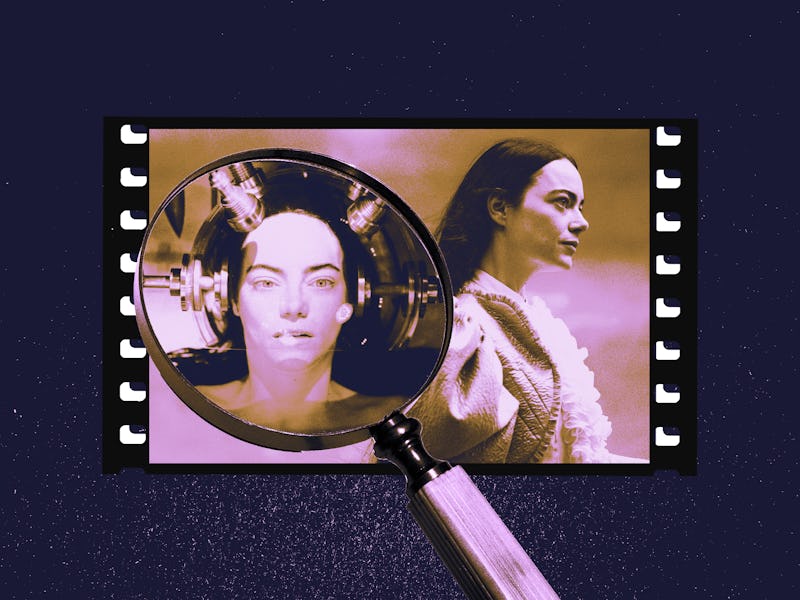Poor Things Overlooks One Fundamental Fact Of Human Psychology
It turns out psychological development is difficult to portray with authenticity.

The following contains spoilers for Poor Things.
If you were hoping for a deep dive into the real-life science behind transplanting prenatal brains into dead bodies and reanimating the corpse, I have some disappointing news for you.
Poor Things — the latest bizarre yet somehow heartwarming film by Yorgos Lanthimos — is, at its core, a fresh take on Frankenstein tale, taking the basic premise from Mary Shelley’s story of reanimating the dead. Bella Baxter, the story’s headstrong, insatiable heroine portrayed by Emma Stone, demonstrates that psychology is the real science worth examining.
Based on a 1992 novel of the same name, this captivating tale follows Bella from her unnatural conception through the stages of maturation and self-actualization. Viewers learn she, in her previous life, was a pregnant woman named Victoria who died by suicide. Pre-eminent surgeon Godwin Baxter finds Victoria’s body after she dies, but finds that her fetus is still alive. Then, in true sci-fi fashion, he transplants the fetus’ brain into hers, transforming her into a physically developed woman with the literal brain of a newborn. Bella’s mind, abilities, and hair all grow with preternatural speed. It doesn’t take long before she’s either reading or humping everything in sight while traveling the world in search of herself.
Philippe Rochat, a developmental psychologist and psychology professor at Emory University, tells Inverse that this film is “a total adult projection on development.”
This story is macabre through and through, but it’s ultimately human. As such, Bella’s psychological development is one of its most fascinating aspects. The audience sees Emma Stone toddle about screeching phonemes and peeing herself like any tot as she slowly learns about nature, human suffering, and, yes, sex.
Poor Things certainly isn’t trying to be a masterclass in developmental psychology, but it still portrays some parallel milestones that viewers may find familiar.
Body and mind intertwined
It turns out psychological development is difficult to portray with authenticity. Philippe Rochat, a developmental psychologist and psychology professor at Emory University, tells Inverse that this film is “a total adult projection on development.” He recognizes, though, that “it's very complicated to get a synthetic view of development.”
The film fractures development in part by creating a stark contrast between the mind and body. From what we understand about psychological development, our minds and bodies are enmeshed, evolving in tandem to inform our sense of self.
“We are not in the time of Descartes or the ancient Greeks, where there was some kind of an idealist view of the mind,” Rochat tells Inverse. He’s referring to 16th-century French philosopher Rene Descartes’ theory of mind-body dualism, which views the mind and body as distinct entities that can function independently of each other. This question persists as the mind-body problem, which concerns all aspects of how consciousness and the physical body exist together.
The film fractures development in part by creating a stark contrast between the mind and body. From what we understand about psychological development, our minds and bodies are enmeshed, evolving in tandem to inform our sense of self.
According to Rochat, one informs the other. He describes the human intellect as “an embodied mind,” meaning that for infants, sensory stimuli to a developing body are integral to the brain’s development. One example of this embodied experience is how an infant experiences her own touch as opposed to a touch from another person, which also shows self-differentiation. Described in a 1997 paper, Rochat’s lab found that the rooting reflex (an involuntary oral response that helps with breastfeeding) indicates differentiation of self and other. “They root significantly less when it's themselves … as opposed to the finger of someone else,” Rochat says. With that, the mind experiences selfhood through the body, not in spite of it.
The self in society
Crucial to Bella’s growth is also how she learns to integrate with society. As she gallivants off to Lisbon, her boy-toy Duncan Wedderburn eagerly points out all the etiquette she flouts. For infants, learning social norms also means learning defiance. “There’s a development of dissent,” Rochat says. “With conformity, you create the possibility of protesting against the norm.” Children often learn these rules beginning in pre-school, he says.
Poor Things certainly isn’t trying to be a masterclass in developmental psychology, but it still portrays some parallel milestones that viewers may find familiar.
Her understanding of society dramatically changes when she learns about human suffering during an excursion to Alexandria in Egypt, after which she devotes herself to improving the world. Rochat says that between 10 and 18 months, a baby can distinguish between those who hinder and those who help. By age 2, “kids will spontaneously try to soothe someone who is feeling hurt,” suggesting that, in Bella’s case, this is an appropriate milestone.
One of the film’s raunchier (and potentially fraught) preoccupations is Bella’s discovery of masturbation and sexuality relatively early in the film. Rochat says that in infants, the mouth is a baby’s erotic zone, even in the womb, but Bella seems to bypass the oral phase completely.
However, perhaps a more accurate psychological portrayal is how Bella’s relationship to sex evolves. Rochat says sex can be generalized as the pursuit of pleasure, which may be sublimated into other forms like music. While Poor Things embraces sexuality as part of one’s agency, the over-the-top lust eventually tempers. As Bella learns about and eventually monetizes her libido, she also discovers pleasure’s more refined forms.
Surprisingly, this may be the story’s psychological center. Rochat confirms that pleasure is a central driving force in humanity, from explicit eroticism to sublimated desire. Bella’s quest for experience turns from tawdry to fine-tuned, which may be the most human part of her psychological development.
“Pleasure is at the core of what we do,” Rochat says. “That's the driving force in the broad sense. It's what keeps us alive.”